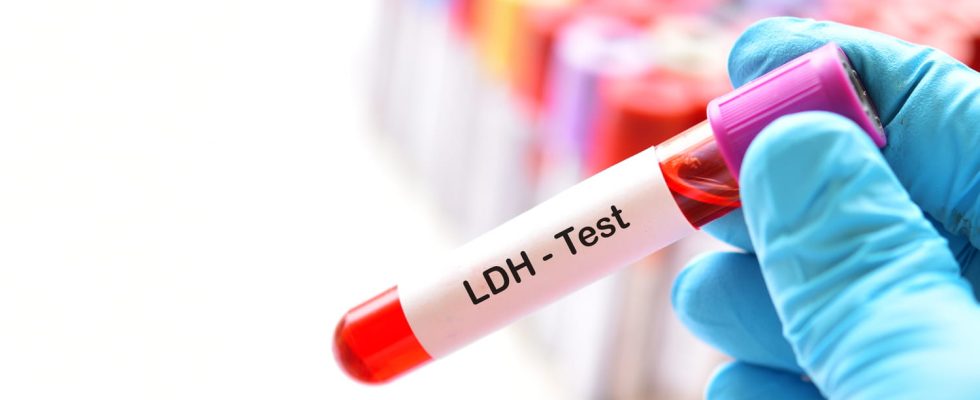Lactate dehydrogenase (LDH) is measured by taking a blood test. It is a marker of tissue damage (infarction, liver disease, lung). What does a high rate mean? Down ?
What is the meaning of LDH?
LDH or lactate dehydrogenase is a tissue damage marker. This enzyme is normally contained in most body tissues, and only in small amounts in the blood. When the tissues are damaged, the cells release LDH resulting in an increase in its concentration in the blood. There are several forms of LDH called isoenzymes. Each is located in specific organs:
- THE LDH1 and 2 are present in the heart, kidneys, brain and red blood cells
- There LDH3 in platelets, lymph nodes, and neoplastic tissue
- THE LDH4 and 5 in liver, muscle, skin and neoplastic tissue.
Why do an LDH test?
“Combined with other tests, the LDH assay may be prescribed when the physician suspects certain types of cell or tissue damage” explains Dr. Chougar. The examination then makes it possible to determine the cause of this lesion, to know its location and to control its evolution. LDH can thus be measured in the diagnosis of myocardial infarction, liver or lung disease.
Do you have to be fasting to measure LDH?
LDH levels are measured through a blood sample, usually taken from the crease of the elbow. “It is not necessary to be fasting for this particular test, but it is often requested in conjunction with other tests which may require fasting. Do not hesitate to ask the question beforehand to the laboratory” says the specialist.
What is the normal LDH value?
In adults, the normal values of the LDH assay are between 140 and 245 U/L, the standards and units of measurement may vary depending on the technique used.
What does high LDH mean?
An increase in the concentration of lactate dehydrogenase in the blood can highlight several conditions:
- Liver (hepatic) disease
- Kidney (kidney) disease
- Heart disease (heart attack, etc.)
- A muscle condition
- A blood disorder (haematological)
- Cancer
- A big burn
- Taking certain medications
What does low LDH mean?
Low LDH has no particular medical significance and should not be cause for concern. “This can be observed in case of overconsumption of vitamin C.”
Is it worrying? When to consult?
Do not hesitate to seek advice from the biologist at the laboratory where you took your blood test to have an explanation of your analysis results. “LDH is never prescribed alone but as part of an overall assessment, it is therefore necessary to analyze all the values as well as the context which led to the realization of this blood test” recalls Dr. Taous Chougar.
Thanks to Dr Taous Chougar, biologist in the Paris region.
